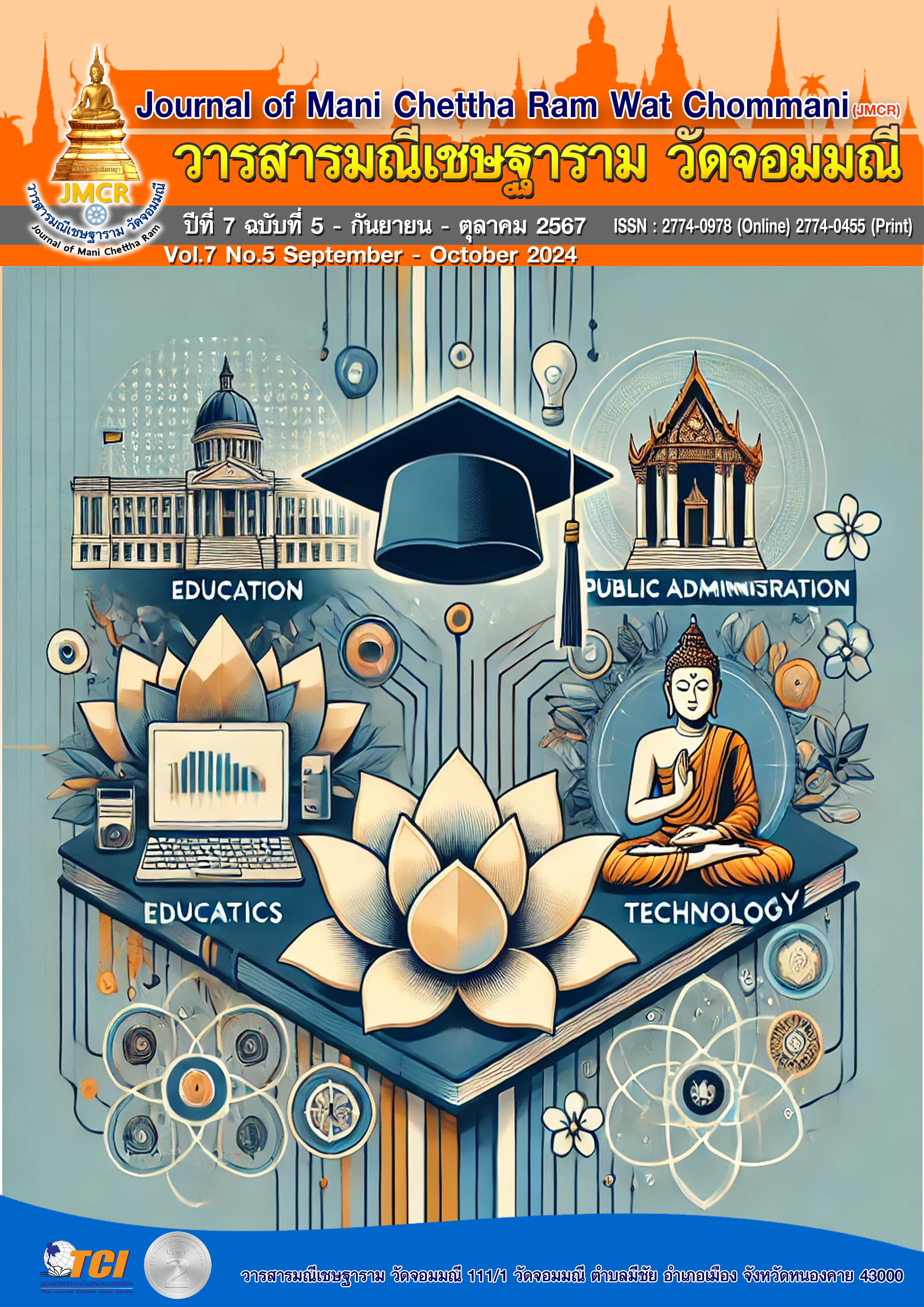ADAPTIVE LEADERSHIP OF SCHOOL ADMINSTRATORS UNDER DEVELOPMENT OF LEARNING ENCOURAGEMENT,EDUCATION MINISTRY, LOEI PROVINCE
Keywords:
Adaptive leadership, school administrators, Loei Provincial Office Of Learning EncouragementAbstract
The objective of this research is (1) to study the level of adaptive leadership of administrators #educational institutions-(2) to compare the level of adaptive leadership of school administrators-classified by gender: age and work experience-(3) to study the development approach of adaptive leadership of school administrators-under the Loei Provincial Learning Promotion Office-The sample used in this research consists of-school administrators-and teachers:Under:Department of Learning Promotion- Ministry of Education-Loei Province-Number-167-people-statistics used in data analysis-including average percentage-standard deviation and statistics that test the value-(t-Test) and one-way variation synthesis (One-way-Anova) Finding statistically significant differences, testing the average difference in pairs with the method of Cheffe-(Scheffe') The research results found that
- The level of adaptive leadership of school administrators under the Department of Learning Promotion, Ministry of Education: Loei Province - found that the overall picture is at a very high level when considering each aspect in descending order of average as follows: the overall vision of knowledge management and the area with the least average is - having adaptive challenges.
- Modified leadership of school administrators - under - Department of Learning Promotion, Ministry of Education: Loei Province Classified by - Gender: Age and overall work experience and all aspects are not different.
- Guidelines for the development of adaptive leadership of school administrators - under the Department of Learning Promotion, Ministry of Education, Loei Province - consists of-5. Aspects: as follows: 1) Executive cultural competence should have the creation of understanding, values-beliefs and culture 2) Knowledge management Executives should use technology in management-train to be an observer-thinker. Analysis- 3) Creating a roundness: Executives should accept the opinions of their colleagues: have *love, kindness-wish for the good for others-4)Holistic vision-Executives should create their own vision, understand the current state of society and be immune to future changes-5)Adjustive challenges-Executives should have emotional intelligence, build good relationships with others, be creative-and adapt to change.
References
กาญจนา ธานะ. (2551). ความสัมพันธ์ระหว่างปัจจัยส่วนบุคคล ความฉลาดทางอารมณ์ สภาพแวดล้อมในการทำงานและภาวะผู้นำการปรับเปลี่ยนของหัวหน้าหอผู้ป่วย โรงพยาบาลเอกชน. กรุงเทพมหานคร: มหาบัณฑิต: จุฬาลงกรณ์มหาวิทยาลัย.
นวรัตน์วดี ชินอัครวัฒน์. (2563). การพัฒนาโปรแกรมเสริมสร้างภาวะผู้นำการปรับเปลี่ยนสำหรับหัวหน้ากลุ่มสาระการเรียนรู้ใน โรงเรียนมัธยมศึกษา สังกัดสำนักงานคณะกรรมการการศึกษา ขั้นพื้นฐาน. ศึกษาดุษฎีบัณฑิต:มหาวิทยาลัยมหาสารคาม.
Bradberry, T., & Greaves, J. (2012). Leadership 2.0: Learn the secrets of adaptiveleadership. San Diego, CA: Talent Smart.
Glover, Jerry; Rainwater, Kelley; Jones, Gordon; Friedman, Harris. (2002). Adaptive leadership (Part Two): Four principles for being adaptive. Organization Development Journal.
Glover, J., Jone, G. & Friedman, H. (2002). Adaptive Leadership Theory, Adaptive Leadership: When change is not enough. Organization Development Journal.
Hogan, T. J. (2008). The adaptive leadership maturity model. OrganizationDevelopment Journal.Heifetz, R. and Donald L. [Reprinted by permission from Harvard Business Review (January-February 1997) : pages 124-134.] October16, 2016.
Heifetz, R. A., Linsky, M., & Grashow, A. (2009). The practice of adaptive leadership: Tools and tactics for changing your organization and the world. Cambridge: Harvard
Lewis, P.H. (2008). Readiness to Change toward Cultural Awareness and Sensitivity in a State Mental Health Organization. Verginia: Verginia Commonwealth University.
Mills, L. (2010). The Relationship Between Moral Reasoning and Knowledge Management Processing. U.S.A.: Walden University.
Pronovost, P., J. (2011). Navigating adaptive challenges in quality improvement.Retrieved August 19, 2016, from. http://qualitysafety.bmj.com/content/20/7/560
Rhead, S. (2011). Adaptive Leadership-Diagnose the system. Retrieved December 9,2016, from http://leadersinstituteofsa.wordpress.com/2011/09/13/Adaptive- Leadership-Diagnose-the-system.
Thomas, K. W., & Kilmann, R. H. (2008). Thomas-Kilmann Conflict Mode Instrument. Retrieved from http:// www. organizationimpact.
com/wpcontent/uploads/2016/08/TKI_Sample_ Report.pdf.




